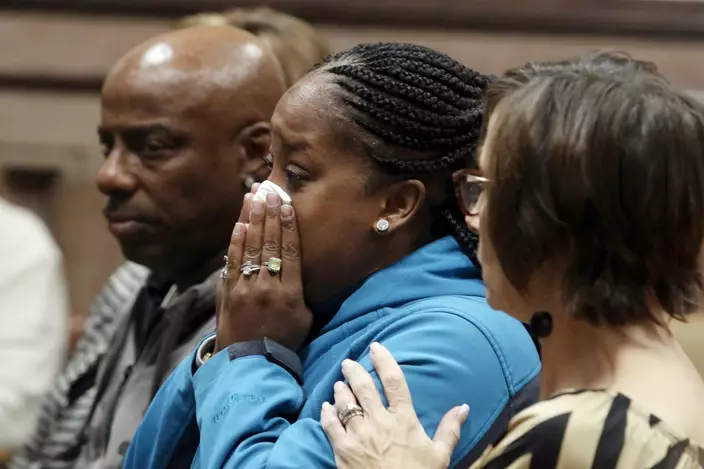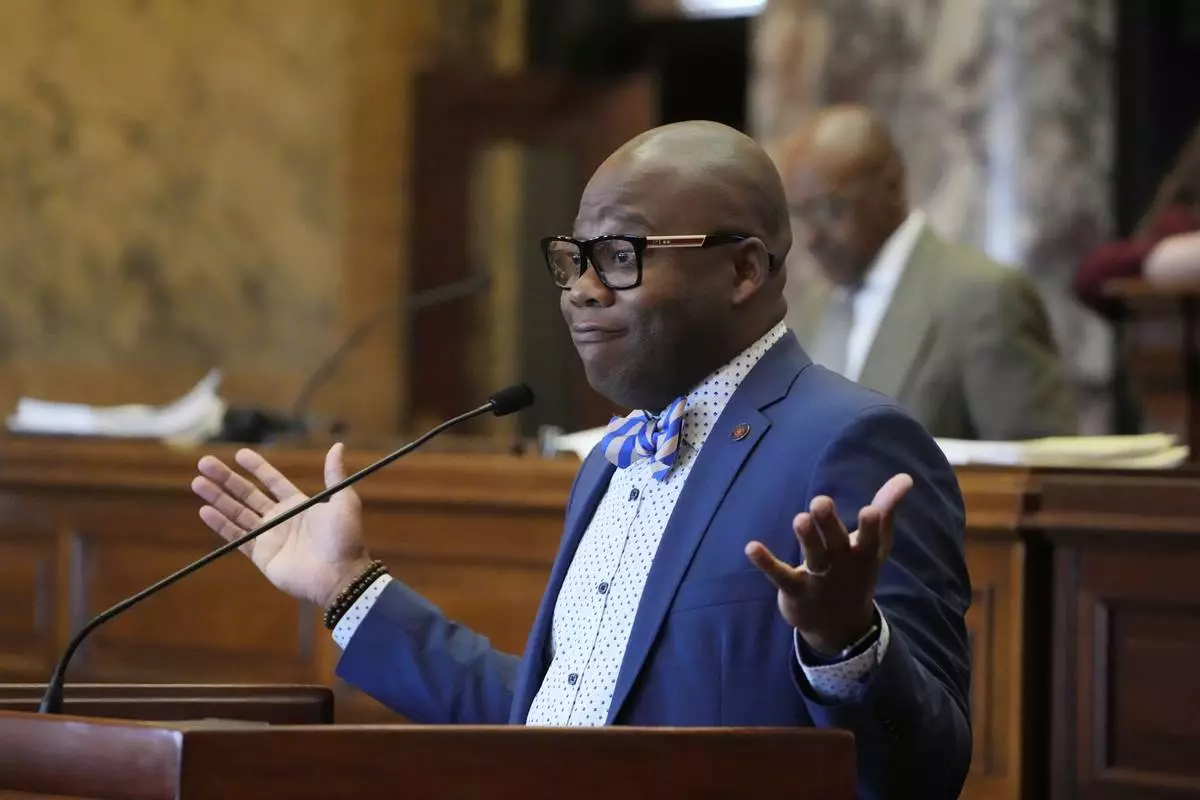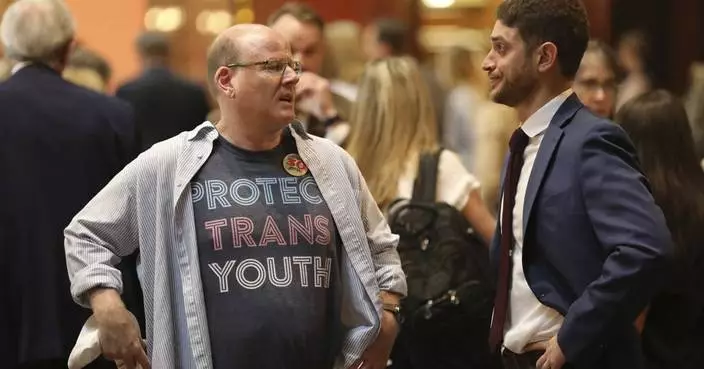At least 25 transgender people in the United States have been homicide victims so far this year, the highest annual total on record, according to advocacy groups that have been monitoring the grim phenomenon and seeking ways to reduce the toll.

In this Friday Nov. 3, 2017 file photo, Katrina Johnson becomes emotional at the South Lee County Courthouse in Keokuk, Iowa after the jury returned a guilty verdict for Jorge Sanders-Galvez in the death of Johnson's transgender child, 16-year-old Kedarie Johnson. (John Lovretta/The Hawk Eye via AP, Pool)
The Human Rights Campaign, in a report released Friday, calculated that 102 transgender people have been killed in the U.S. over the past five years — including 25 this year. Its report, jointly sponsored by the Trans People of Color Coalition, was issued ahead of Monday's annual Transgender Day of Remembrance observations, commemorating the hundreds of transgender people killed worldwide each year.
Another monitoring group, the National Coalition of Anti-Violence Programs , has tallied 26 homicides of transgender and gender-nonconforming people in the U.S. so far this year.
Both groups say their counts may be incomplete because transgender victims are sometimes misidentified in police and news reports. In some cases, it has taken weeks or months for friends and family to publicly clarify the gender identity of a victim who had transitioned from the gender given in initial police accounts of the death.
The Human Rights Campaign provided a statistical breakdown of the 102 killings since January 2013. It said that 88 of the victims were transgender women, and that nearly all of them were black or Hispanic. Nearly three-quarters were under age 35, including four minors. And 55 of the victims were killed in the South, including 16 of this year's victims.
"Their killings were committed by lovers, acquaintances, family members, neighbors and strangers," the report said. "While every story highlighted in this report is unique and tragic, they all also reflect a legacy of intolerance, hate and discrimination that transgender people must navigate and surmount every day."
The report noted that most states do not have laws prohibiting discrimination against transgender people.
"Indeed, in many states, anti-transgender bias is ingrained and systematically enforced in nearly all aspects of life, including in laws and government agencies, schools, housing, health care and employment," the report said.
The result, said the report, is a disproportionately high rate of poverty — 30 percent — among transgender people.
"Many of those living in poverty rely on the underground economy to survive, including sex work, drug sales and other currently criminalized work," the report said. "These dangerous situations may put transgender people at a higher risk of police harassment, sexual assault and fatal violence."
While many of the transgender homicides draw no more than scant local news coverage, two recent cases have attracted national attention.
In Missouri, LGBT activists have asked the state attorney general to oversee an investigation of the death of a transgender teenager whose body was mutilated and burned in September.
ctivists have raised concerns about the response of the local sheriff and prosecutor to the death of 17-year-old Ally Lee Steinfeld. The local officials insist the slaying wasn't a hate crime.
The U.S. Justice Department sent a federal hate crimes lawyer to Iowa to help prosecute a man charged with killing a transgender teenager last year, an unusual decision by Attorney General Jeff Sessions even as he takes other steps to weaken the rights of transgender people. A jury on Nov. 3 convicted Jorge Sanders-Galvez, 23, of first-degree murder in the fatal shooting of 16-year-old Kedarie Johnson in Burlington, Iowa, in March 2016. A trial for a second man charged with murder in the case, Jaron Purham, 25, is set for Feb. 20, 2018.
Sessions says the Justice Department no longer considers transgender people shielded from workplace discrimination under federal law, and he has issued sweeping guidance on protecting religious freedom that undercuts protections for LGBT people.
JACKSON, Miss. (AP) — Mississippi’s Republican-led Legislature completed a last-ditch effort Thursday to revive a bill to regulate transgender people’s use of bathrooms, locker rooms and dormitories in public education buildings.
Lawmakers pushed the proposal through the House and Senate in the final days of their four-month session after negotiations between the chambers broke down Monday on an earlier proposal. Republicans said they received a flurry of messages urging them to bring the bill back to life.
“This probably, to a lot of our constituents and to a lot of people in this chamber, is probably the most important bill that we brought up,” said Senate President Pro Tempore Dean Kirby, a Republican.
The legislation would require all public education institutions to equip their buildings with single-sex restrooms, changing areas and dormitories.
People would only be allowed to enter spaces that correspond to their sex assigned at birth, regardless of their appearance or any procedures they've had to affirm their gender identity. Those who violate the policy could be sued, but schools, colleges and universities would be protected from liability.
Democrats said the bill would put transgender people at risk. They also criticized Republicans for spending time on the issue as other legislative priorities remained unfinished.
"It just baffles me that we have things we can do to improve the state of Mississippi for all people, for all people, but we get so pumped on something that's national politics," said Rep. Jeffrey Hulum III, a Democrat. “It is not my job to criticize how people live their lives.”
Republicans said they were standing up for female family members on college campuses and pointed to several Republican women, wearing red, as they looked on from the Senate gallery.
One of those women was Anja Baker, a member of the Mississippi Federation of Republican Women from the Jackson suburb of Rankin County. Baker said she works with social service providers and was concerned women would be crowded out of spaces they rely on.
“They only have so many resources, and they need to have their locations and resources protected for the women that need them instead of getting caught in a game of identity politics,” Baker said.
Advocacy groups emailed her and other Republican women late Wednesday urging them to show up Thursday at the Capitol. That came after an initial measure mandating single-sex spaces stalled, causing an embittered back-and-forth between top legislators.
Just before a Monday night deadline, the House offered a plan that would let people file lawsuits seeking monetary damages if someone uses a bathroom not assigned to their gender, said Senate Judiciary A Committee Chairman Brice Wiggins, a Republican. Wiggins said that made it an unacceptable “trial lawyer bill."
House Judiciary A Committee Chairman Joey Hood, also a Republican, said the Senate forced the House into accepting a weaker proposal. The bill would let people sue, but they would be unable to claim compensatory damages from any lawsuit. As a result, Hood and other House members said the bill they ultimately approved would likely fail to deter people from entering spaces that don't align with their sex assigned at birth.
Hood said he hopes the Legislature would introduce legislation in 2025 with stronger penalties.
Another proposal failed this year that would have denied the legal recognition of transgender people by writing into law that “there are only two sexes, and every individual is either male or female.”
In 2021, Republican Gov. Tate Reeves signed legislation to ban transgender athletes from competing on girls’ or women’s sports teams. Last year, he signed a bill to ban gender-affirming hormones or surgery for anyone younger than 18.
The Mississippi proposals were among several bills being considered in state legislatures around the country as Republicans try to restrict transgender people’s access to gender-affirming care, bathrooms and sports, among other things.
—-
Michael Goldberg is a corps member for the Associated Press/Report for America Statehouse News Initiative. Report for America is a nonprofit national service program that places journalists in local newsrooms to report on undercovered issues. Follow him at @mikergoldberg.

Mississippi State Rep. Fabian Nelson, D-Jackson, asks for a clarification on a bill to regulate transgender people's use of bathrooms, locker rooms and dormitories in public education buildings, before the House at the state Capitol in Jackson, Miss., Thursday, May 2, 2024. (AP Photo/Rogelio V. Solis)

Mississippi State Rep. Jansen Owen, R-Poplarville, asks a question regarding a bill to regulate transgender people's use of bathrooms, locker rooms and dormitories in public education buildings, before the House at the state Capitol in Jackson, Miss., Thursday, May 2, 2024. (AP Photo/Rogelio V. Solis)

Mississippi State Rep. John Faulkner, D-Holly Springs, asks a question on a bill to regulate transgender people's use of bathrooms, locker rooms and dormitories in public education buildings, before the House at the state Capitol in Jackson, Miss., Thursday, May 2, 2024. (AP Photo/Rogelio V. Solis)

Mississippi State Rep. Joey Hood, R-Ackerman, explains a bill to regulate transgender people's use of bathrooms, locker rooms and dormitories in public education buildings, before the House at the state Capitol in Jackson, Miss., Thursday, May 2, 2024. (AP Photo/Rogelio V. Solis)

Mississippi State Senate President Pro Tempore Sen. Dean Kirby, R-Pearl, holds a folder with files for the Senate Rules Committee, in the Senate Chamber at the state Capitol in Jackson, Miss., Thursday, May 2, 2024. (AP Photo/Rogelio V. Solis)

Mississippi State Sen. Bradford Blackmon, D-Canton, asks a question in the Senate chamber at the state Capitol in Jackson, Miss., Thursday, May 2, 2024. (AP Photo/Rogelio V. Solis)

Mississippi State Sen. Angela Hill, R-Picayune, addresses the legislators in the Senate Chamber at the state Capitol in Jackson, Miss., Thursday, May 2, 2024. (AP Photo/Rogelio V. Solis)

Mississippi State Sen. Derrick Simmons, D-Greenville, gestures while speaking at the well before the body in the Senate chamber at the state Capitol in Jackson, Miss., Thursday, May 2, 2024. (AP Photo/Rogelio V. Solis)

Mississippi State Sen. Brice Wiggins, R-Pascagoula, gestures while speaking at the well before the body in the Senate chamber at the state Capitol in Jackson, Miss., Thursday, May 2, 2024. (AP Photo/Rogelio V. Solis)

A group of Republican women from throughout the state watch procedures in the Senate chamber at the state Capitol in Jackson, Miss., Thursday, May 2, 2024. (AP Photo/Rogelio V. Solis)




















